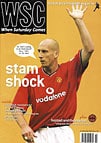 The football website intended to bring extensive football coverage to those in the US but as Rich Zahradnik explains the dream soon decended into a nightmare as spiralling costs and debt meant that the site had to be closed down
The football website intended to bring extensive football coverage to those in the US but as Rich Zahradnik explains the dream soon decended into a nightmare as spiralling costs and debt meant that the site had to be closed down
Football: speed, colour, noise, passion, even – when you’re lucky – dazzle. The web: click, click, click, yawn, click. Was there ever a bigger mismatch? The dotcoms are now dot-bombs and it’s become fun to bash the net. Did football gain anything from the web frenzy besides more of big media’s tentacles in the game?
First, by way of disclosure, I was and am a dot-commer. My first online project was in football, a bulletin board service called GoalNet, launched in collaboration with WSC in early 1995 as the web made its lightning move from academia to the commercial world. Soccernet, Football365, the BBC’s site, newspapers sites, other sports sites, all lit up the lines. Football may have been the new rock ’n’ roll a decade ago, but by 1995 the web was “the new new thing” in the parlance of Silicon Valley.
I returned to football in 1999 when I signed on as president of Goal Media Group, a company with the ambitious goal of building a global network of football sites. We set up goalnetwork.com for UK and North American fans and todogol.com for Spanish-speaking fans in the western hemisphere. We were going to be there for every fan, everywhere. Instead, we ran out of money and the sites went dark.
A typical dotcom story, you’re thinking – just more greedy folks chasing a pile of money. I won’t deny I hoped I’d retire a little earlier than planned. At the same time, I never believed in the stratospheric values placed on all those little dotcom companies. It was clear to me that a business with sales and potential profits equivalent to a medium-sized magazine should not have a stock market value equal to that of BT (certainly not a well-run BT).
Goal Media Group had people who cared about the sport and about what we were trying to do. Alan Rothenberg, Mr Football in the US and the man who ran the 1994 World Cup, was our chairman. Roberto Baggio and David Platt were investors, and US coach Bruce Arena and Colombian midfielder Carlos Valderrama signed on to write columns. Writers, editors, technical staff and managers continued to work on the sites for months after we ran out of money. Our mission was a good one. We wanted to bring to a US audience the kind of coverage the traditional media has not given and will not give football.
For the UK audience, our aim (a tougher one in a much more sophisticated football market) was to deliver global coverage to fans we thought were tired of the parochialism of the next Man Utd headline followed by another retread of the Three Lions metaphor. Like I said, a good mission. And the best job I’ve ever had. While much of the civilised world glories in the great comeuppance of the dotcom crowd – “they weren’t as smart or clever or even rich as the rest of us” – it’s not a bad time to look at what the web has done for the fan.
Goalnetwork.com did not fulfil its goal, but the collective web, in a weird way, did it for us. As a football fan trapped in the American media sphere, I now have multiple sources for coverage of my national team and my MLS team. Even a press release on an official site is news when you don’t get coverage from the press. I’m also a fan of Nottingham Forest and of the global game, and if you think the US team and the MetroStars are poorly covered here, imagine what US papers and TV stations give me on football in the east midlands or Senegal.
Press coverage of football in the UK is different, you say. There’s tons of it. The web wasn’t needed. Really? A supporter who loves any club not in the Premiership can now get coverage unimagined in the days before the web. Real-time news and results are there for free, rather than for the many-pence-per-second cost of Clubcall. There are many fans in the UK who want to follow the game outside their own country, where the traditional media often fails to deliver.
In the glory days two years ago, the web was going to set us free. It would feed the poor. Teach the illiterate. Bring peace. We would soar into the air as great disembodied cyber-intelligences like one of those fuzzy light balls in Star Trek. Full results and goal scorers are enough for me.
From WSC 176 October 2001. What was happening this month